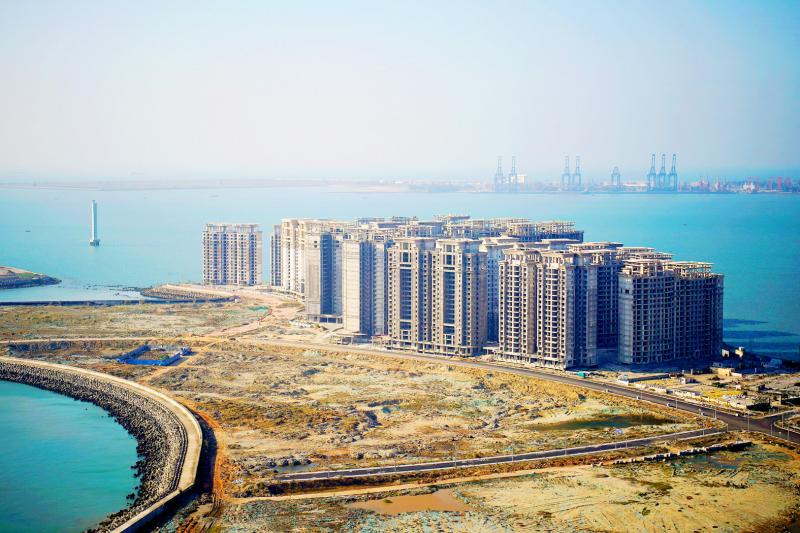Corporate debt defaults and a stretching real-estate bubble have complicated China’s economic outlook, although the risk to Taiwanese markets remains low, the Mainland Affairs Council said in a report published in February.
The report assessing the potential effect of Chinese economic conditions on Taiwan is part of a set of briefings on China and cross-strait affairs commissioned by the council.
Chinese financial markets have since November 2020 been rocked by a wave of debt defaults at state-owned enterprises, wrote lead author Li Chi-keung (李志強), an associate professor at Tamkang University’s Graduate Institute of China Studies.

Photo: Reuters
Available data show at least 143 debt defaults last year totaling 185.45 billion yuan (US$29.14 billion), a 30 percent increase over the previous year and a new record, Li said, adding that the trend is expected to continue this year.
Meanwhile, it remains unknown whether the collapse of troubled developer China Evergrande Group could end a real-estate bubble, the report said.
Evergrande’s 1.9 trillion yuan debt is “only the tip of the real-estate iceberg,” Li said.
As of June last year, developers had collectively amassed debt totaling 32.5 trillion yuan — about 28.4 percent of China’s GDP — of which 960.3 billion yuan is due this year, he said.
Real estate likely accounted for 6.8 percent of China’s GDP last year, Li said.
When the construction industry is included in the figures, the proportion rises to 13.8 percent, and to 29 percent if related services such as sales are included, he said.
Once the bubble bursts, the financial impact would be just as extreme as what occurred after the 2007 subprime mortgage crisis in the US, Li said.
Even if housing prices do not collapse, the depressed market would dampen China’s economic growth this year, challenging its 5.5 percent growth target, he added.
Despite these risks, Li said he does not foresee any major or imminent impact on Taiwan.
A full-scale financial crisis is unlikely in the near term, considering the nature of China’s state-run financial system and strict capital outflow restrictions, he wrote.
China and Taiwan also have relatively independent finances, meaning that a financial collapse in China would have limited direct effects on Taiwanese markets, he said, adding that outstanding debts owed to Taiwanese supply-chain firms pose the greatest challenge.
However, Chinese efforts to mitigate risk might have some effect on Taiwanese firms, Li said.
Beijing is to “deleverage” by tightening lending and monetary policy, further depressing corporate investment, with a domino effect on demand for raw materials and components from Taiwan, he said.
Effects would vary across industries, with steel, concrete and plastics experiencing the most significant losses, he wrote, citing a 21.9 percent decline in steel exports to China and Hong Kong in December last year.
However, demand in the electronics industry remained steady, he added.
In investment terms, production capacity by Taiwanese firms has gradually moved out of China in the wake of the US-China trade dispute and the COVID-19 pandemic, the report said.
Taiwanese firms last year invested US$5.86 billion in China, excluding Hong Kong, a decline of 0.7 percentage points year-on-year, it said.
Considering carbon curbs and electricity restrictions in China, coupled with financial risks and a cooling economy, the downward trend is expected to continue into this year, it added.

The manufacture of the remaining 28 M1A2T Abrams tanks Taiwan purchased from the US has recently been completed, and they are expected to be delivered within the next one to two months, a source said yesterday. The Ministry of National Defense is arranging cargo ships to transport the tanks to Taiwan as soon as possible, said the source, who is familiar with the matter. The estimated arrival time ranges from late this month to early next month, the source said. The 28 Abrams tanks make up the third and final batch of a total of 108 tanks, valued at about NT$40.5 billion

Travel agencies in Taiwan are working to secure alternative flights for travelers bound for New Zealand for the Lunar New Year holiday, as Air New Zealand workers are set to strike next week. The airline said that it has confirmed that the planned industrial action by its international wide-body cabin crew would go ahead on Thursday and Friday next week. While the Auckland-based carrier pledged to take reasonable measures to mitigate the impact of the workers’ strike, an Air New Zealand flight arriving at Taipei from Auckland on Thursday and another flight departing from Taipei for Auckland on Saturday would have to

A group from the Taiwanese Designers in Australia association yesterday represented Taiwan at the Midsumma Pride March in Melbourne. The march, held in the St. Kilda suburb, is the city’s largest LGBTQIA+ parade and the flagship event of the annual Midsumma Festival. It attracted more than 45,000 spectators who supported the 400 groups and 10,000 marchers that participated this year, the association said. Taiwanese Designers said they organized a team to march for Taiwan this year, joining politicians, government agencies, professionals and community organizations in showing support for LGBTQIA+ people and diverse communities. As the first country in Asia to legalize same-sex

MOTIVES QUESTIONED The PLA considers Xi’s policies toward Taiwan to be driven by personal considerations rather than military assessment, the Epoch Times reports Chinese President Xi Jinping’s (習近平) latest purge of the Chinese People’s Liberation Army (PLA) leadership might have been prompted by the military’s opposition to plans of invading Taiwan, the Epoch Times said. The Chinese military opposes waging war against Taiwan by a large consensus, putting it at odds with Xi’s vision, the Falun Gong-affiliated daily said in a report on Thursday, citing anonymous sources with insight into the PLA’s inner workings. The opposition is not the opinion of a few generals, but a widely shared view among the PLA cadre, the Epoch Times cited them as saying. “Chinese forces know full well that